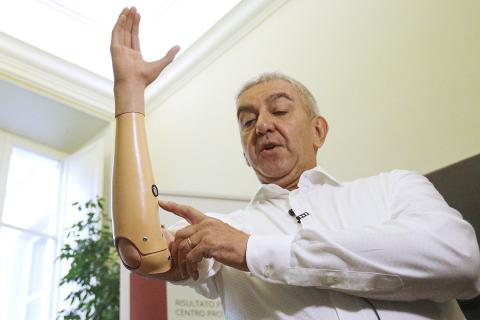Italian researchers on Thursday unveiled a robotic hand they say allows users to grip objects more naturally and features a design that is to lower the price significantly.
The Hennes robotic hand has a simpler mechanical design compared with other such myoelectric prosthetics, characterized by sensors that react to electrical signals from the brain to the muscles, said researcher Lorenzo de Michieli.
He helped develop the hand in a laboratory backed by the Italian Institute of Technology and the INAIL state workers’ compensation prosthetic center.

Photo: AP
The Hennes has only one motor that controls all five fingers, making it lighter, cheaper and more able to adapt to the shape of objects.
“This can be considered low-cost because we reduce to the minimum the mechanical complexity to achieve, at the same time, a very effective grasp and a very effective behavior of the prosthesis,” De Michieli said. “We maximized the effectiveness of the prosthetics and we minimized the mechanical complexity.”
They plan to bring it to market in Europe next year with a target price of about 10,000 euros (US$11,921), about 30 percent below current market prices.
The lighter design could help overcome some resistance in users to the myoelectric hands, which to date have been too heavy for some, said Arun Jayaraman, a robotic prosthetic researcher at the Shirley Ryan AbilityLab in Chicago.
Italian researchers say the Hennes weighs about the same as a human hand.
In the US, many amputees prefer the much simpler hook prosthetic, which attaches by a shoulder harness, because it allows them to continue to operate heavy equipment, Jayaraman said.
Italian retiree Marco Zambelli has been testing the Hennes hand for the past three years. He lost his hand in a work accident while still a teenager and has used a variety of prosthetics over the years.
A video presentation shows him doing a variety of tasks, including removing bills from an automated teller machine, grasping a pencil and driving a stick-shift car.
“Driving, for example, is not a problem,” Zambelli, 64, said, who has also learned to use a knife to eat with. “Now I have gotten very good at it. I think anyone who’s not looking with an expert eye would find it difficult to spot that it’s an artificial hand.”
About a dozen labs worldwide are working on improvements to the myoelectric prosthetic, with some focusing on touch and others on improving how the nervous system communicates with the prosthetic.
“Each group is giving baby steps to help the field move forward,” Jayaraman said.
Cost remains a barrier for advanced prosthetic limbs and the more complex motorized systems tend to be “heavy and fragile. They also get hard to control,” University of Pittsburgh assistant professor of rehabilitation Robert Gaunt said.
“[The Hennes design] could make a difference. I think it is a clever approach and one that could see significant benefits for people with missing hands,” he said.
Limitations remain the inability to control individual fingers for tasks like playing the piano or typing on a computer.
However, “the vast majority of what many of us do with our hands every day is simply grasp objects,” Gaunt said.

The US dollar was trading at NT$29.7 at 10am today on the Taipei Foreign Exchange, as the New Taiwan dollar gained NT$1.364 from the previous close last week. The NT dollar continued to rise today, after surging 3.07 percent on Friday. After opening at NT$30.91, the NT dollar gained more than NT$1 in just 15 minutes, briefly passing the NT$30 mark. Before the US Department of the Treasury's semi-annual currency report came out, expectations that the NT dollar would keep rising were already building. The NT dollar on Friday closed at NT$31.064, up by NT$0.953 — a 3.07 percent single-day gain. Today,

‘SHORT TERM’: The local currency would likely remain strong in the near term, driven by anticipated US trade pressure, capital inflows and expectations of a US Fed rate cut The US dollar is expected to fall below NT$30 in the near term, as traders anticipate increased pressure from Washington for Taiwan to allow the New Taiwan dollar to appreciate, Cathay United Bank (國泰世華銀行) chief economist Lin Chi-chao (林啟超) said. Following a sharp drop in the greenback against the NT dollar on Friday, Lin told the Central News Agency that the local currency is likely to remain strong in the short term, driven in part by market psychology surrounding anticipated US policy pressure. On Friday, the US dollar fell NT$0.953, or 3.07 percent, closing at NT$31.064 — its lowest level since Jan.

The New Taiwan dollar and Taiwanese stocks surged on signs that trade tensions between the world’s top two economies might start easing and as US tech earnings boosted the outlook of the nation’s semiconductor exports. The NT dollar strengthened as much as 3.8 percent versus the US dollar to 30.815, the biggest intraday gain since January 2011, closing at NT$31.064. The benchmark TAIEX jumped 2.73 percent to outperform the region’s equity gauges. Outlook for global trade improved after China said it is assessing possible trade talks with the US, providing a boost for the nation’s currency and shares. As the NT dollar

The Financial Supervisory Commission (FSC) yesterday met with some of the nation’s largest insurance companies as a skyrocketing New Taiwan dollar piles pressure on their hundreds of billions of dollars in US bond investments. The commission has asked some life insurance firms, among the biggest Asian holders of US debt, to discuss how the rapidly strengthening NT dollar has impacted their operations, people familiar with the matter said. The meeting took place as the NT dollar jumped as much as 5 percent yesterday, its biggest intraday gain in more than three decades. The local currency surged as exporters rushed to